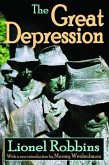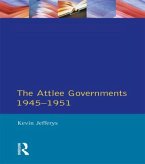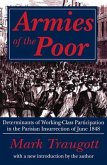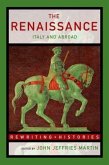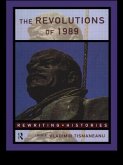Edmund Dell / Christopher Hill (eds.)English Revolution of 1640-1660
The Good Old Cause
English Revolution of 1640-1660
Herausgeber: Dell, Edmund; Hill, Christopher
Edmund Dell / Christopher Hill (eds.)English Revolution of 1640-1660
The Good Old Cause
English Revolution of 1640-1660
Herausgeber: Dell, Edmund; Hill, Christopher
- Broschiertes Buch
- Merkliste
- Auf die Merkliste
- Bewerten Bewerten
- Teilen
- Produkt teilen
- Produkterinnerung
- Produkterinnerung
This book examines the English revolution from 1640-1660, with particualr attenion to the social structure of England at the time.
Andere Kunden interessierten sich auch für
![The Routledge Companion to Historical Studies The Routledge Companion to Historical Studies]() Alun MunslowThe Routledge Companion to Historical Studies36,99 €
Alun MunslowThe Routledge Companion to Historical Studies36,99 €![The Mystic Mind The Mystic Mind]() Jerome KrollThe Mystic Mind54,99 €
Jerome KrollThe Mystic Mind54,99 €![The Great Depression The Great Depression]() Lionel RobbinsThe Great Depression66,99 €
Lionel RobbinsThe Great Depression66,99 €![The Attlee Governments 1945-1951 The Attlee Governments 1945-1951]() Kevin JefferysThe Attlee Governments 1945-195165,99 €
Kevin JefferysThe Attlee Governments 1945-195165,99 €![Armies of the Poor Armies of the Poor]() Mark TraugottArmies of the Poor63,99 €
Mark TraugottArmies of the Poor63,99 €![The Renaissance The Renaissance]() The Renaissance59,99 €
The Renaissance59,99 €![The Revolutions of 1989 The Revolutions of 1989]() The Revolutions of 198964,99 €
The Revolutions of 198964,99 €-
-
-
This book examines the English revolution from 1640-1660, with particualr attenion to the social structure of England at the time.
Hinweis: Dieser Artikel kann nur an eine deutsche Lieferadresse ausgeliefert werden.
Hinweis: Dieser Artikel kann nur an eine deutsche Lieferadresse ausgeliefert werden.
Produktdetails
- Produktdetails
- Verlag: Routledge
- 2. Auflage
- Seitenzahl: 492
- Erscheinungstermin: 14. November 1969
- Englisch
- Abmessung: 216mm x 140mm x 29mm
- Gewicht: 688g
- ISBN-13: 9780714614830
- ISBN-10: 0714614831
- Artikelnr.: 21699850
- Herstellerkennzeichnung
- Libri GmbH
- Europaallee 1
- 36244 Bad Hersfeld
- gpsr@libri.de
- Verlag: Routledge
- 2. Auflage
- Seitenzahl: 492
- Erscheinungstermin: 14. November 1969
- Englisch
- Abmessung: 216mm x 140mm x 29mm
- Gewicht: 688g
- ISBN-13: 9780714614830
- ISBN-10: 0714614831
- Artikelnr.: 21699850
- Herstellerkennzeichnung
- Libri GmbH
- Europaallee 1
- 36244 Bad Hersfeld
- gpsr@libri.de
Christopher Hill, Edmund Dell
Part 1 Social classes before 1640: the landed class
feudal sources of revenue
landowners in developing bourgeois society
sales of land
the new gentry
merchants
the bourgeoisie
the new power of money
hymn for a merchant
a merchant's advice to his son
yeomen
conflicting standards
the lower orders
contrasts of wealth and poverty
paupers
class feeling
the peasant tradition. Part 2 Economic life before 1640: depopulation
peasant grievances
agrarian discontent
direct action
petition against enclosure
London's merchant companies
for free trade
the clothing industry
royal interference with the clothing industry
monopolies
failure to protect interests of merchants. Part 3 The state machine before 1640: the crown
feudal monarchy
a royal favourite
sale of offices and honours
the aristocracy depend on court pickings
the star chamber
the high commission
class privileges spread too wide
the law courts
in prison
justices of the peace
class rule
whom did the House of Commons represent?
danger of military absolutism
parliament and crown
a revolutionary scene
forebodings of conflict
the financial situation
growing difficulties
ship money. Part 4 Church and state before 1640: the doctrines of the Church of England
church and state are one
religion as an instrument of government
what parliamentarians objected to in the church
archbishop laud
what cavaliers objected to in the puritans
what was a puritan?
what the cavaliers feared
Protestantism and the bourgeoisie
the Roman Catholic threat
threat to the reformation in Scotland
threat to the reformation in Ireland
the new philosophy. Part 5 The international situation: an ambassador's observations
appeasing international reaction
the parliamentary attitude
relation of home and foreign policy
influence of the Netherlands
the Dutch Republic - a model and a rival. Part 6 The storm breaks: the opposition organizes
popular pressure on the government
the impeachment of Strafford
abolition of the star chamber
financial control
Charles I tries a coup d'etat
control of the church
the end of government without parliament
appeal to the people
Charles tries another coup
a revolutionary situation
preparations for war
bourgeoisie and parliament
the two sides line up
gentry versus freeholders
cavaliers and roundheads
the class division
importance of the city
fears of the gentry
how to deal with democrats. Part 7 The civil war: causes of civil wars
historical analyses
contemporary views of the causes of the war
parliamentary debate on the causes of the war
religion or class interests?
the parliamentary army and navy
the royalist army
parliamentary finance
royalist finance
effects of war on relations of landlord and tenant
social unrest
the class struggle
administration by parliament
anxiety of the aristocracy
Scottish army versus democracy
Scottish army in English politics
Cromwell demands an army that will fight
the new model ar
feudal sources of revenue
landowners in developing bourgeois society
sales of land
the new gentry
merchants
the bourgeoisie
the new power of money
hymn for a merchant
a merchant's advice to his son
yeomen
conflicting standards
the lower orders
contrasts of wealth and poverty
paupers
class feeling
the peasant tradition. Part 2 Economic life before 1640: depopulation
peasant grievances
agrarian discontent
direct action
petition against enclosure
London's merchant companies
for free trade
the clothing industry
royal interference with the clothing industry
monopolies
failure to protect interests of merchants. Part 3 The state machine before 1640: the crown
feudal monarchy
a royal favourite
sale of offices and honours
the aristocracy depend on court pickings
the star chamber
the high commission
class privileges spread too wide
the law courts
in prison
justices of the peace
class rule
whom did the House of Commons represent?
danger of military absolutism
parliament and crown
a revolutionary scene
forebodings of conflict
the financial situation
growing difficulties
ship money. Part 4 Church and state before 1640: the doctrines of the Church of England
church and state are one
religion as an instrument of government
what parliamentarians objected to in the church
archbishop laud
what cavaliers objected to in the puritans
what was a puritan?
what the cavaliers feared
Protestantism and the bourgeoisie
the Roman Catholic threat
threat to the reformation in Scotland
threat to the reformation in Ireland
the new philosophy. Part 5 The international situation: an ambassador's observations
appeasing international reaction
the parliamentary attitude
relation of home and foreign policy
influence of the Netherlands
the Dutch Republic - a model and a rival. Part 6 The storm breaks: the opposition organizes
popular pressure on the government
the impeachment of Strafford
abolition of the star chamber
financial control
Charles I tries a coup d'etat
control of the church
the end of government without parliament
appeal to the people
Charles tries another coup
a revolutionary situation
preparations for war
bourgeoisie and parliament
the two sides line up
gentry versus freeholders
cavaliers and roundheads
the class division
importance of the city
fears of the gentry
how to deal with democrats. Part 7 The civil war: causes of civil wars
historical analyses
contemporary views of the causes of the war
parliamentary debate on the causes of the war
religion or class interests?
the parliamentary army and navy
the royalist army
parliamentary finance
royalist finance
effects of war on relations of landlord and tenant
social unrest
the class struggle
administration by parliament
anxiety of the aristocracy
Scottish army versus democracy
Scottish army in English politics
Cromwell demands an army that will fight
the new model ar
Part 1 Social classes before 1640: the landed class
feudal sources of revenue
landowners in developing bourgeois society
sales of land
the new gentry
merchants
the bourgeoisie
the new power of money
hymn for a merchant
a merchant's advice to his son
yeomen
conflicting standards
the lower orders
contrasts of wealth and poverty
paupers
class feeling
the peasant tradition. Part 2 Economic life before 1640: depopulation
peasant grievances
agrarian discontent
direct action
petition against enclosure
London's merchant companies
for free trade
the clothing industry
royal interference with the clothing industry
monopolies
failure to protect interests of merchants. Part 3 The state machine before 1640: the crown
feudal monarchy
a royal favourite
sale of offices and honours
the aristocracy depend on court pickings
the star chamber
the high commission
class privileges spread too wide
the law courts
in prison
justices of the peace
class rule
whom did the House of Commons represent?
danger of military absolutism
parliament and crown
a revolutionary scene
forebodings of conflict
the financial situation
growing difficulties
ship money. Part 4 Church and state before 1640: the doctrines of the Church of England
church and state are one
religion as an instrument of government
what parliamentarians objected to in the church
archbishop laud
what cavaliers objected to in the puritans
what was a puritan?
what the cavaliers feared
Protestantism and the bourgeoisie
the Roman Catholic threat
threat to the reformation in Scotland
threat to the reformation in Ireland
the new philosophy. Part 5 The international situation: an ambassador's observations
appeasing international reaction
the parliamentary attitude
relation of home and foreign policy
influence of the Netherlands
the Dutch Republic - a model and a rival. Part 6 The storm breaks: the opposition organizes
popular pressure on the government
the impeachment of Strafford
abolition of the star chamber
financial control
Charles I tries a coup d'etat
control of the church
the end of government without parliament
appeal to the people
Charles tries another coup
a revolutionary situation
preparations for war
bourgeoisie and parliament
the two sides line up
gentry versus freeholders
cavaliers and roundheads
the class division
importance of the city
fears of the gentry
how to deal with democrats. Part 7 The civil war: causes of civil wars
historical analyses
contemporary views of the causes of the war
parliamentary debate on the causes of the war
religion or class interests?
the parliamentary army and navy
the royalist army
parliamentary finance
royalist finance
effects of war on relations of landlord and tenant
social unrest
the class struggle
administration by parliament
anxiety of the aristocracy
Scottish army versus democracy
Scottish army in English politics
Cromwell demands an army that will fight
the new model ar
feudal sources of revenue
landowners in developing bourgeois society
sales of land
the new gentry
merchants
the bourgeoisie
the new power of money
hymn for a merchant
a merchant's advice to his son
yeomen
conflicting standards
the lower orders
contrasts of wealth and poverty
paupers
class feeling
the peasant tradition. Part 2 Economic life before 1640: depopulation
peasant grievances
agrarian discontent
direct action
petition against enclosure
London's merchant companies
for free trade
the clothing industry
royal interference with the clothing industry
monopolies
failure to protect interests of merchants. Part 3 The state machine before 1640: the crown
feudal monarchy
a royal favourite
sale of offices and honours
the aristocracy depend on court pickings
the star chamber
the high commission
class privileges spread too wide
the law courts
in prison
justices of the peace
class rule
whom did the House of Commons represent?
danger of military absolutism
parliament and crown
a revolutionary scene
forebodings of conflict
the financial situation
growing difficulties
ship money. Part 4 Church and state before 1640: the doctrines of the Church of England
church and state are one
religion as an instrument of government
what parliamentarians objected to in the church
archbishop laud
what cavaliers objected to in the puritans
what was a puritan?
what the cavaliers feared
Protestantism and the bourgeoisie
the Roman Catholic threat
threat to the reformation in Scotland
threat to the reformation in Ireland
the new philosophy. Part 5 The international situation: an ambassador's observations
appeasing international reaction
the parliamentary attitude
relation of home and foreign policy
influence of the Netherlands
the Dutch Republic - a model and a rival. Part 6 The storm breaks: the opposition organizes
popular pressure on the government
the impeachment of Strafford
abolition of the star chamber
financial control
Charles I tries a coup d'etat
control of the church
the end of government without parliament
appeal to the people
Charles tries another coup
a revolutionary situation
preparations for war
bourgeoisie and parliament
the two sides line up
gentry versus freeholders
cavaliers and roundheads
the class division
importance of the city
fears of the gentry
how to deal with democrats. Part 7 The civil war: causes of civil wars
historical analyses
contemporary views of the causes of the war
parliamentary debate on the causes of the war
religion or class interests?
the parliamentary army and navy
the royalist army
parliamentary finance
royalist finance
effects of war on relations of landlord and tenant
social unrest
the class struggle
administration by parliament
anxiety of the aristocracy
Scottish army versus democracy
Scottish army in English politics
Cromwell demands an army that will fight
the new model ar




